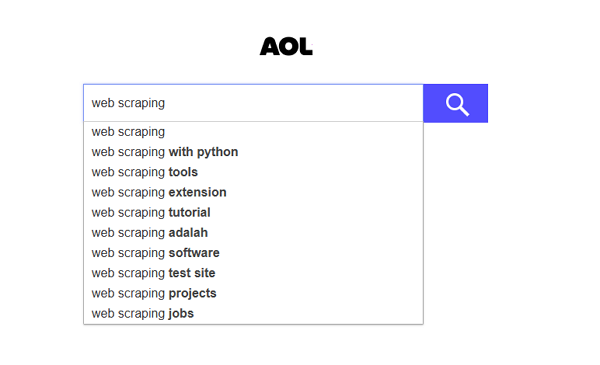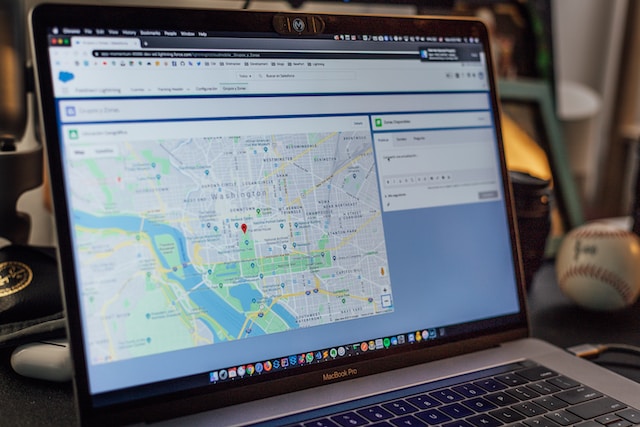Do you want to scrape Google search results and export the data in Excel or CSV format? If you want to monitor your website’s ranking on Google, analyze your competitors, or analyze paid ads on Google, then scraping the search results is the best way to get started.
In this article, we will guide you to learn about different ways (coding and no-coding) to extract results from Google Search and export them into Excel files or the database. The results include organic and paid results, SERP search results like People Also Ask, Related searches, and reviews.
What is Google SERP
Google SERP stands for “Search Engine Results Page“. It refers to the page displayed by Google in response to a user’s search query, which includes organic search results, paid advertisements, featured snippets, knowledge panels, images, videos, news articles, etc.
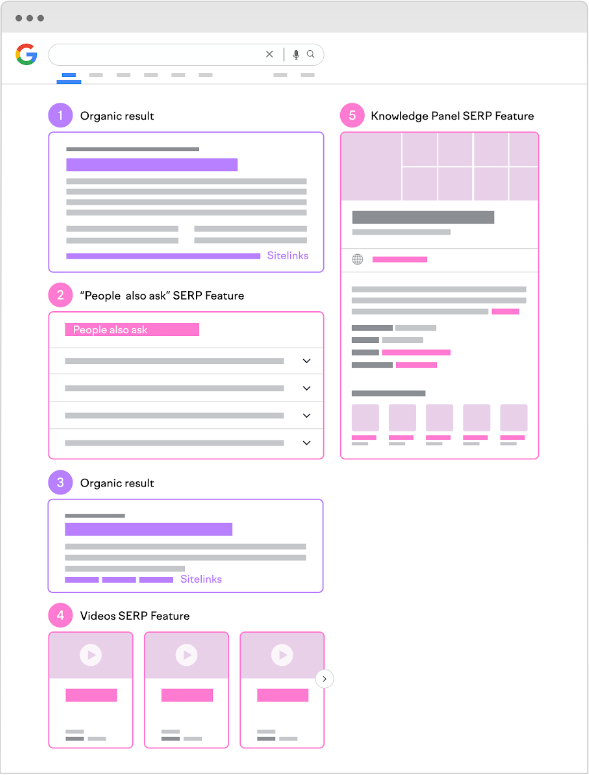
Google continually evolves the design and features of the SERP to enhance the search experience. SERP is considering providing users with the most relevant and helpful information related to their search query.
SERP is very important for SEO strategies. By analyzing SERP features, search rankings, and user intent, you can improve your site visibility, drive your organic traffic, and maximize your online presence.
What Data can You Get from Google Search Results
You can scrape what you see from the results pages after you enter a keyword. Not only for the first page but also all pages with a pagination. Here are some examples of the types of data that can be extracted from Google search results:
- Title
- URL
- Meta description
- Date
- Ads
- Featured snippets
- Videos
- etc.
Does Google Search have an Official API
As of my knowledge cutoff in September 2021, Google does not provide a public API specifically for retrieving search results. The Custom Search JSON API, which was previously available for this purpose, has been deprecated.
However, Google offers several other APIs that provide access to various services and functionalities, such as the Google Maps API, Google Translate API, and Google Sheets API. These APIs allow developers to integrate specific Google services into their applications but do not provide direct access to search results.
Why Scraping Google Search Results
You may have your own purpose of collecting data from Google search results, but there are some general usages or benefits that you can consider.
Market Research
Accessing search result data can provide valuable insights into market trends, consumer behavior, and competitive analysis. It can help businesses understand their target audience, identify popular keywords, and make informed decisions regarding marketing strategies.
SEO Analysis
Analyzing search result data can assist in search engine optimization (SEO) efforts. It can help identify keyword rankings, competition levels, and content gaps, allowing website owners to optimize their content and improve their website’s visibility in search engine results.
Content Creation
Understanding search result patterns and popular topics can guide content creation strategies. By analyzing search result data, content creators can generate relevant and engaging content that aligns with user interests and search intent.
Research and Analysis
Researchers can utilize authorized data from Google’s services in academic studies, market research, sentiment analysis, and other research fields. Accessing search result data can provide valuable information for data-driven research and analysis.
Solution 1: Scrape Google Search Results Without Coding
If you have no idea about coding, you can try the best Google search scraper – Octoparse. It can help you scrape the Google search results without any coding. Octoparse makes the process of data extraction from the web more accessible and faster. It can automatically scrape data from any page and save it in an organized format like Excel files.
The free version of Octoparse can meet most of your scraping needs, but if you’re looking for some advanced features like cloud extraction, scheduled scraping, IP rotation, preset task templates, and some others, then you can ask for an advanced version or the data service. What’s more, Octoparse provides preset scraping templates where you can get data by entering your keywords and a few clicks.
Turn website data into structured Excel, CSV, Google Sheets, and your database directly.
Scrape data easily with auto-detecting functions, no coding skills are required.
Preset scraping templates for hot websites to get data in clicks.
Never get blocked with IP proxies and advanced API.
Cloud service to schedule data scraping at any time you want.
In the next part, you can follow the easy steps about extracting search results data from Google. Similarly, you can use the following steps to extract search results from not only Google but also Bing or DuckDuckGo.
Preset templates to scrape Google SERP online
If you don’t want to download any software to your device and just want to extract Google Search data once a time, you can try Octoparse online data scraping template, which allows you to scrape Google Search data online within a few clicks.
https://www.octoparse.com/template/google-search-results-scraper
https://www.octoparse.com/template/google-search-scraper
3 steps to export Google search results without coding
Step 1: Open Google in Octoparse and enter the search keyword
After installing Octoparse on your device, we will start by entering the Google URL in the Octoparse application and clicking on Start.
After that, we will click on the search bar in Google and click on the “enter text” button in the Tip Box. Then we enter the search keyword that we want to search for on Google.
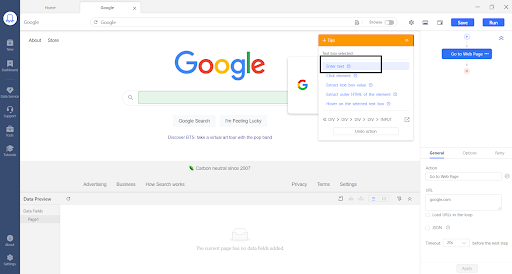
Then click on the search button on Google and click “Click Button” on the Tip Box. This will click the Search button, and we will be sent to the search result page of Google.
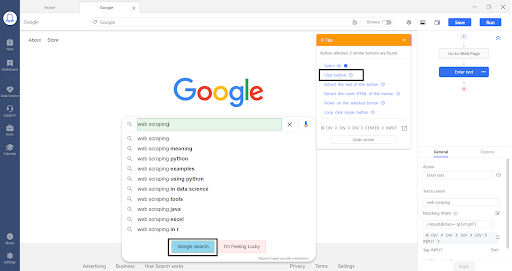
Step 2: Select the data that you need to extract
When we get to the search result page, we click on the data that we need to extract. For example, if we want to extract the search result title, click on the first and second titles, and it will automatically select all the other titles.
Then click on “Extract Text of Selected Element” and the scraper is ready to get all the titles from the search result.
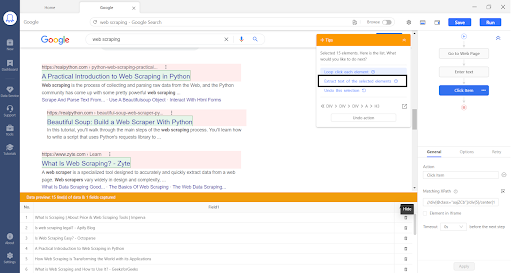
If you need more information on scraping Google search results with Octoparse and you need to extract other data like the URL of the site, title, meta description, and other details, or you want to paginate to the next pages of Google search results, then you can check out Google Search results scraping guide.
Step 3: Export scraped Google search results into Excel
Click the “Run” button at the top to start the scraping process. Select whether you want to run the scraper on your device or on the cloud. Once the run is complete, you can click on the ‘Export Data’ button and export the scraped Google search result data in different formats like Excel, HTML, CSV, or JSON.
Video tutorial: Scraping data from Google Search
Solution 2: Export Google Search Results With Python
If you have some programming experience and are comfortable coding, then you can use Python with the Beautiful Soup Library to scrape the search results. To use this method to scrape Google search results, you will first need to install the Python language on your computer. If you need help installing Python on your PC, you can check out this tutorial on installing Python.
Once Python is installed, you will need to install two modules, bs4, and requests. bs4(Beautiful Soup) is a Python library used to read XML and HTML data from the web. The request is a module that allows you to send HTTP requests to the website. You can install both modules with the following command in your terminal or command prompt.
Once the bs4 and requests modules are installed, you can use the following code to scrape the results.
You can then change the value of the text variable in the above code to your desired search keyword.
For example, change text=’web scraping’ to text=’octoparse’.
Then running this Python script will give you the output of all the results in the search result.
Solution 3: Get Google SERP Data Using API
As mentioned above, many people want to scrape Google SERP data for marketing development. How to scrape Google SERP features more efficiently? Actually, a web scraping tool, like Octoparse, can help you extract SERP data like title, link, description, date, and the SERP position directly. What’s more, SERP API tools are also popular in that they can handle proxies, solve captchas, and parse all kinds of rich structured data from Google searches.
Some of the most popular Google SERP APIs are:
FAQ about Scraping Google Search
After reading the scraping process, here are some basic knowledge and frequently asked questions about Google search results scraping you must know.
Is it legal to scrape Google search results
Many people may wonder if it is ok to scrape data from Google results. Does Google allow data scraping? Is there a high possibility of being banned by Google? In summary, it is complex to define the legality of
scraping Google search results. Web scraping is not inherently illegal. Its legality depends on factors such as website terms of service, scraped content, and operating jurisdiction.
So, being cautious is essential. We advise you to read Google’s terms of service before scraping, following website terms, and ask for permission when needed. For example, Google’s Terms of Service clearly state that scraping is prohibited in their “robots.txt” file.
It’s also important to learn the laws and rules of your country. And personal privacy data is generally protected by laws in most countries. Another important consideration is your data usage; please note that it is not allowed for commercial or profitable purposes. You can also read the is web scraping legal article to learn more about this question.
Tips for scraping Google without getting blocked
- Use Proxy servers
- Rotate IP addresses
- Use CAPTCHA solving services.
- Control scraping speed
- Respect Google’s Robots.txt
- Use Legitimate APIs
- Avoid scraping images
- Avoid JavaScript
Final Words
Scraping Google Search results can provide valuable insights for market research, SEO analysis, and competitive intelligence. While scraping Google search data offers significant advantages, it’s important to follow ethical practices and comply with Google’s terms of service to avoid potential legal issues.
Whether you’re using Octoparse for a no-code solution or Python/API for a more customizable approach, there are various tools and methods available to help you extract the data you need efficiently. By following best practices and using the right tools, you can seamlessly collect and analyze Google Search results to make informed business decisions.
Download Octoparse and have a free trial now to begin extracting Google search results easily!


